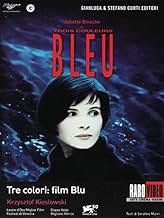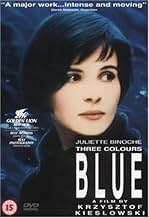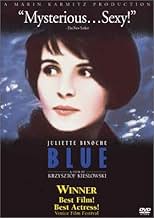Uma mulher luta para encontrar uma maneira de viver sua vida após a morte de seu marido e filho.Uma mulher luta para encontrar uma maneira de viver sua vida após a morte de seu marido e filho.Uma mulher luta para encontrar uma maneira de viver sua vida após a morte de seu marido e filho.
- Direção
- Roteiristas
- Artistas
- Prêmios
- 22 vitórias e 19 indicações no total
Benoît Régent
- Olivier
- (as Benoit Regent)
Charlotte Véry
- Lucille
- (as Charlotte Very)
Hélène Vincent
- La journaliste
- (as Helene Vincent)
Yann Trégouët
- Antoine
- (as Yann Tregouet)
Avaliações em destaque
10patita-1
The subject(mourn,lost)is so interesting and profound that this film is a real treasure. It is very difficult to write about 'Bleu' because this film has so many intense scenes,with many details.Juliette Binoche's vulnerability is in every scene, every gesture, every moment. She plays an enigmatic woman,'Julie,' we're witness to her terrible loss(her husband who was a famous composer and her daughter died in a car crash)She is the survivor,not only of the accident,but of herself too.The film doesn't show us how her life was before the tragedy,but' Bleu' focuses on her personal journey to healing.
Julie seems stoic,she did not criy hysterically or stay in bed totally depressed,her grief is intimate and touching.In one scene when Julie is near the blue crystal mobile(which belonged to her daughter) just notice her reaction.Another poignant scene is when Julie is in that swimming pool,suddenly,she stops and she can hear her husband's symphony(all in her head).
Bleu also approaches a philosophical question-when you lose everything can you start all over again?,life is a series of events and choices,Julie moves to another place from the country to a city.She did not want to see her friends,she wants to be alone but is this possible?,her past will haunt her.
Another interesting aspect of this film is the use of music instead of dialogue,her silence is a reference of her terrible loss and pain,she is not depressed but sad. Also the meaning of the unfinished symphony of her husband is very profound (is connected with her grief and healing)
The photography of the film and the beautiful and delicate face of Binoche contribute to the impact of BLEU.
Kieslowski was one of the most talented directors, I really admired his 'Trois couleurs' trilogy but I think,'Bleu' was his most powerful film.
10/10
Julie seems stoic,she did not criy hysterically or stay in bed totally depressed,her grief is intimate and touching.In one scene when Julie is near the blue crystal mobile(which belonged to her daughter) just notice her reaction.Another poignant scene is when Julie is in that swimming pool,suddenly,she stops and she can hear her husband's symphony(all in her head).
Bleu also approaches a philosophical question-when you lose everything can you start all over again?,life is a series of events and choices,Julie moves to another place from the country to a city.She did not want to see her friends,she wants to be alone but is this possible?,her past will haunt her.
Another interesting aspect of this film is the use of music instead of dialogue,her silence is a reference of her terrible loss and pain,she is not depressed but sad. Also the meaning of the unfinished symphony of her husband is very profound (is connected with her grief and healing)
The photography of the film and the beautiful and delicate face of Binoche contribute to the impact of BLEU.
Kieslowski was one of the most talented directors, I really admired his 'Trois couleurs' trilogy but I think,'Bleu' was his most powerful film.
10/10
Blue is one of those little movies that grows on you. The more you think about it the more you like it. That's not to say that it's not enjoyable to view; the cinematography and music are marvelous. But this is Juliette Binoche's movie. Everything revolves around her character, Julie, who, in the first scene, survives an automobile accident that claims the lives of her famous composer husband and her five-year-old daughter. Now alone the remainder of the movie delves into Julie's long emotional recovery. Not traumatic, or depressing as the subject matter may imply it is instead subtle, graceful, and beautiful.
TROIS COLOURES: BLEU is a rich, dark film with all the Kieslowski marks: death, silence, depression, and the inner torment of outwardly attractive women. After seeing the whole trilogy and the DEKALOG, I'm convinced at Kieslowski's great talent, and his very early death was a true blow to world cinema. Much like Kubrick but with a less ironic nature, Kieslowski loves to make his characters and stories both humanely distant, realistic, and, at the same time, philosophically idealist and dense. I enjoyed BLEU more than BLANC (which was an odd machismic entry in a trilogy mainly focusing on women) but not as much as ROUGE, which I feel is one of the finest, most beautiful, most well-done films I've ever seen.
More specifically, BLEU's focus seems to be on the relationship of a woman's loss of the tactile manifestation of her husband's existance with the ligering notions of his life - especially his music, which pervades the entire film, interrupting at key moments with a blackout and short blast of the overture. To watch Julie struggle with her husband's abandoned secrets (including a mistress Julie befriends) is shattering, frustrating, and perplexing.
Unfortunately, life must move, and, due to that, I can't watch BLEU over and over. However, I did glean from one viewing the complexity of this picture, and recognize its need to be watched over and over, until Kieslowski's last gasps can be properly understood, which is all we can hope to return to a man whose genius was tragically cut short, but still stands as a giant in my view of cinema.
More specifically, BLEU's focus seems to be on the relationship of a woman's loss of the tactile manifestation of her husband's existance with the ligering notions of his life - especially his music, which pervades the entire film, interrupting at key moments with a blackout and short blast of the overture. To watch Julie struggle with her husband's abandoned secrets (including a mistress Julie befriends) is shattering, frustrating, and perplexing.
Unfortunately, life must move, and, due to that, I can't watch BLEU over and over. However, I did glean from one viewing the complexity of this picture, and recognize its need to be watched over and over, until Kieslowski's last gasps can be properly understood, which is all we can hope to return to a man whose genius was tragically cut short, but still stands as a giant in my view of cinema.
Instead of saying which is the best and worst (though have often heard 'Red' cited best and 'White' the weakest, though all three films are generally very highly thought of) of Krzysztof Kieslowski's "Three Colours" trilogy, it will just be said that all three films in the trilogy are must-watches in their own way.
The first film in the trilogy 'Three Colours: Blue' serves as a very poignant exploration of grief and liberty (in the emotional sense), and to me it is one of the most moving and interesting depictions of grief and liberty in film. It is heavily symbolic, with its intricate use of music, the dominant use of the colour blue in the colour palette, its interesting use of fade outs (though actually different to their usual use, representative of time standing still rather than it passing or a scene conclusion), links to the main character's past (here the use of falling) and the bottle recycling, but not in an incoherent sense.
Visually, 'Three Colours: Blue' looks stunning. The whole film is shot with aesthetic grace and elegance and while the use of blue is dominant for symbolic reasons it is never gimmicky or cheap. Kieslowski's direction is thoughtful and never intrusive, and the intricate music score and the symbolic way it's utilised (representing Julie's struggles with isolation) is inspired, "Song for the Unification of Europe" is one of the most emotional tracks of music in any film seen by me recently.
Story-wise, 'Three Colours: Blue' challenges in a way but also always engages, mainly because of how movingly and intensely it deals with the tragic story of Julie and its themes of grief and liberty. The pacing is deliberate but never hits a dull spot.
One of 'Three Colours: Blue' is the astonishing performance from Juliette Binoche, an intensely affecting portrayal that ranks high up with her best performances. All the cast are fine, particularly Benoît Régent and Emmanuelle Riva, but in the acting stakes this is Binoche's film.
All in all, a beautiful, thought-provoking and moving film, and a wonderful start for a very interesting trilogy of films. 10/10 Bethany Cox
The first film in the trilogy 'Three Colours: Blue' serves as a very poignant exploration of grief and liberty (in the emotional sense), and to me it is one of the most moving and interesting depictions of grief and liberty in film. It is heavily symbolic, with its intricate use of music, the dominant use of the colour blue in the colour palette, its interesting use of fade outs (though actually different to their usual use, representative of time standing still rather than it passing or a scene conclusion), links to the main character's past (here the use of falling) and the bottle recycling, but not in an incoherent sense.
Visually, 'Three Colours: Blue' looks stunning. The whole film is shot with aesthetic grace and elegance and while the use of blue is dominant for symbolic reasons it is never gimmicky or cheap. Kieslowski's direction is thoughtful and never intrusive, and the intricate music score and the symbolic way it's utilised (representing Julie's struggles with isolation) is inspired, "Song for the Unification of Europe" is one of the most emotional tracks of music in any film seen by me recently.
Story-wise, 'Three Colours: Blue' challenges in a way but also always engages, mainly because of how movingly and intensely it deals with the tragic story of Julie and its themes of grief and liberty. The pacing is deliberate but never hits a dull spot.
One of 'Three Colours: Blue' is the astonishing performance from Juliette Binoche, an intensely affecting portrayal that ranks high up with her best performances. All the cast are fine, particularly Benoît Régent and Emmanuelle Riva, but in the acting stakes this is Binoche's film.
All in all, a beautiful, thought-provoking and moving film, and a wonderful start for a very interesting trilogy of films. 10/10 Bethany Cox
An accident results in loss and pain, the rejection of a world that you refrain, you seek withdrawal, isolation, segregation, separation, and transition to a life, where you abstain. But seclusion still has links and ties and cords, that retract and pull and cannot be ignored, reconnection through a box, reveals a secret that's unlocked, that begins to reconnect, and to restore.
It's a wonderful performance from Juliette Binoche as she elegantly weaves Kieslowski's tale of freedom into a contemporary setting. Packed full of symbolism that requires numerous visits to absorb, you may find a myriad of interpretations of your own too.
It's a wonderful performance from Juliette Binoche as she elegantly weaves Kieslowski's tale of freedom into a contemporary setting. Packed full of symbolism that requires numerous visits to absorb, you may find a myriad of interpretations of your own too.
Você sabia?
- CuriosidadesAt the 2018 Visegrad Film Forum, cinematographer Slawomir Idziak claimed that the script and initial cut of this film focused on the journalist character (played by Hélène Vincent) and her efforts to investigate the authorship of the unfinished musical composition that drives the plot. It was only during the editing process that director Krzysztof Kieslowski re-structured the film to focus on Julie (played by Juliette Binoche).
- Erros de gravaçãoWhen Oliver tells Julie he will not incorporate her changes into the musical score, a boom mic is visible briefly as Julie puts down the phone.
- Citações
Julie Vignon: Now I have just one thing left to do: nothing. I want no possessions, no memories, no friends, no lovers -- they're all traps.
- Cenas durante ou pós-créditosThe final credit says in French, "We thank Alfa Romeo who allowed the scene of the accident to the Alfa 164 whose dynamics are of course purely imaginary."
- ConexõesFeatured in The 51st Annual Golden Globe Awards (1994)
Principais escolhas
Faça login para avaliar e ver a lista de recomendações personalizadas
- How long is Three Colors: Blue?Fornecido pela Alexa
Detalhes
- Data de lançamento
- Países de origem
- Central de atendimento oficial
- Idiomas
- Também conhecido como
- Tres colores: Azul
- Locações de filme
- Palais de Justice, Paris 1, Paris, França(hall of justice)
- Empresas de produção
- Consulte mais créditos da empresa na IMDbPro
Bilheteria
- Faturamento bruto nos EUA e Canadá
- US$ 1.324.974
- Fim de semana de estreia nos EUA e Canadá
- US$ 6.413
- 5 de dez. de 1993
- Faturamento bruto mundial
- US$ 1.552.993
- Tempo de duração1 hora 38 minutos
- Cor
- Mixagem de som
- Proporção
- 1.85 : 1
Contribua para esta página
Sugerir uma alteração ou adicionar conteúdo ausente

Principal brecha
What was the official certification given to A Liberdade é Azul (1993) in Japan?
Responda
![Assistir a Bande-annonce [OV]](https://m.media-amazon.com/images/M/MV5BZGFhMTA5ODQtM2Q4OC00NTI0LTkyYjgtMGViODA0YWZjZmI3XkEyXkFqcGdeQXRyYW5zY29kZS13b3JrZmxvdw@@._V1_QL75_UX500_CR0)
![Three Colors: Blue: The Criterion Collection [Blu-ray]](https://m.media-amazon.com/images/M/MV5BZThmZGMzY2EtZTdiNy00NjMwLTk1YTQtOTVlNGIxYjRhZGYzXkEyXkFqcGdeQXVyNzU1NzE3NTg@._V1_QL75_UX500_CR0)































